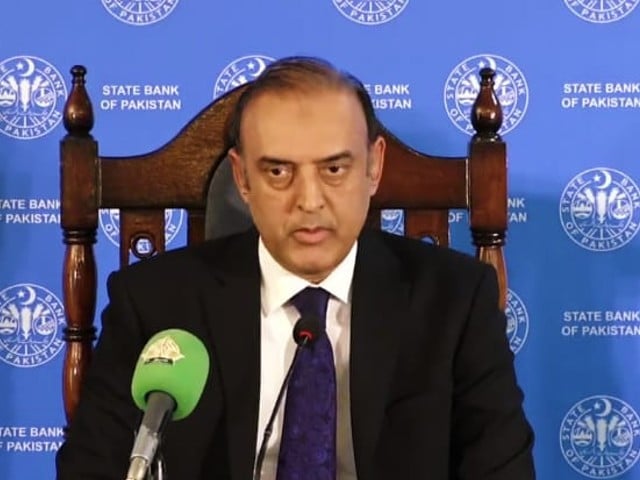By Staff Reporter
KARACHI: The central bank kept its key interest rate unchanged for a fifth straight meeting on Monday, as it expects inflation to ease from March after staying elevated for months.
The State Bank of Pakistan (SBP) maintained the policy rate at 22 percent, in line with the market expectations. The decision comes as the country faces high energy prices, a widening current account deficit and rising debt repayments.
“The SBP maintained the policy rate at 22 percent as the large and frequent changes in administered energy prices have not only impeded a persistent fall in inflation expectations but also slowed down the rate of inflation decline that was previously expected,” the SBP governor Jameel Ahmad told a news conference.
“The current monetary policy stance is appropriate and we will continue it,” Ahmad said. “The tight monetary policy stance must be maintained due to the elevated levels of core and headline inflation.”
Pakistan’s key rate was raised to an all-time high of 22 percent in June to fight persistent inflationary pressures and to meet one of the conditions set by the IMF for securing the bailout.
The decision comes after the inflation quickened for the second consecutive month in December as the IMF-backed hikes in energy costs and a weak currency stoked price gains.
Ahmad said inflation, which was 29.7 percent in December, will remain high for the next one or two months before declining from March. “March onwards is when you will see a decline in inflation.”
The central bank raised its average inflation projection for the fiscal year ending in June to 23-25 percent from 20-22 percent previously, citing the impact of recent energy tariff hikes. It also revised its inflation target for June 2025 to 5-7 percent from 4-6 percent, saying it will take one quarter longer to achieve the goal.
“However, that target has now been revised, and it would now be achieved by September 2025 – a difference of one quarter,” the governor said.
Pakistan’s economy has shown signs of recovery after being hit hard by the external account crisis and the central bank expects the gross domestic product to grow 2-3 percent in the current fiscal year.
Ahmad said the current account deficit projection for fiscal year 2023-24 is between 0.5 percent to 1.5 percent of GDP. “Risks remain to the current account despite the improvement.”
Mohammed Sohail, the CEO at Topline Securities Limited, said the policy announcement was in line with market consensus. “An increase in the average CPI [consumer price index] estimate was also expected as SBP revised its estimate in July and January only,” Sohail said.
“SBP agrees that the external account position and business confidence have improved, but inflation, though falling, is still high for an immediate rate cut.”
The central bank governor said Pakistan is expected to repay $24.5 billion in total in FY24, which includes roughly $20.7 billion in principal repayments and $3.8 billion in interest payments. The majority of the debt has been successfully repaid or rolled over, leaving $10 billion in unpaid balances. Of this outstanding sum, about $5 billion is expected to be rolled over.
As a result, the net amount to be repaid stands at approximately $5 billion, scheduled for repayment in the remaining months of FY24.
“Our external debt profile has improved because short-term commercial borrowings have already been repaid,” the governor said. “So our external debt vulnerability has significantly decreased.”
Earlier this month, Pakistan received $700 million in loan from the IMF under a 3 billion stand-by agreement. The IMF funds are critical to revive Pakistan’s economy and will help the country secure financing from other creditors like Saudi Arabia. It will also provide some relief for Pakistan’s caretaker government under Prime Minister Anwaar-ul-Haq Kakar ahead of elections scheduled for early February.
The SBP governor said the new government will make the final choice on the next programme with the IMF. “However in comparison to the last negotiation when Pakistan entered the stand-by arrangement programme in July, the country is now in a more advantageous position.”
Copyright © 2021 Independent Pakistan | All rights reserved




